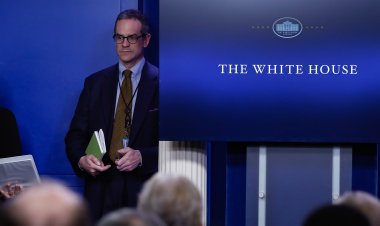Increasing Number of Democrats Worry That the Party's Image Is Beyond Damaged – It's "broken"
There is a consensus that the working class has been lost, yet opinions diverge significantly on the cause and potential solutions.

In the aftermath of Kamala Harris' defeat, the scale of the party's failures has become increasingly apparent. The ongoing struggle with working-class White voters continues, but exit polls reveal that blue-collar Latinos and certain Black men, historically essential to the Democratic base, are also turning away, resulting in significant electoral losses. Republicans have successfully flipped the Senate and are expanding their majority, while Democrats see their hopes of regaining a House majority dwindling. Additionally, Donald Trump's overwhelming victory can only be characterized as a modern landslide.
“The Democratic Party needs to be rebuilt,” remarked Pramila Jayapal, chair of the Congressional Progressive Caucus. “We have become a party of elites, whether we abandoned working-class people, whether they abandoned us, whether it’s some combination of all of the above.”
In conversations with 16 elected officials, party leaders, and strategists, members from all factions of the party expressed that they have lost touch with the working class, which was once central to their identity. However, they showed deep divisions regarding the source of the problem and how to address it. The return of Trump to the political arena has reignited the debate between progressives and moderates about the party's direction, reminiscent of the discussions following his victories in 2016 and 2020.
Sen. Bernie Sanders initiated this clash on Wednesday, stating on X that “it should come as no great surprise that a Democratic Party which has abandoned working class people would find that the working class has abandoned them.” In response, Democratic National Committee Chair Jaime Harrison labeled Sanders’ comments as “straight up BS,” asserting that President Joe Biden is “the most-pro worker President of my lifetime.”
The race for the next chair of the Democratic National Committee is set to be a key battleground where the party will navigate its future amid Trump’s resurgence. Some progressives have suggested Wisconsin Democratic Party leader Ben Wikler as a potential candidate. Jayapal expressed her support for someone like Wikler, while other rumored contenders include New Jersey Gov. Phil Murphy and Minnesota Democratic Party head Ken Martin.
However, Democrats must first assess the aftermath of Tuesday’s elections. Some moderate Democrats attribute Harris' decline among non-college-educated and lower-income voters to a party perceived to have shifted too far left, claiming that associations with immigration reform, transgender rights, and abortion access hampered them in competitive districts.
Rep. Henry Cuellar, who managed to win in Texas border counties that Trump also carried, indicated that border issues are a major concern for members in battleground House districts. Cuellar noted an existing “undercurrent of tension” among Latinos in his district, who feel frustrated by the federal government's support for undocumented immigrants in the form of food, shelter, and healthcare.
This year, he explained, “the dam busted here where all of a sudden people said enough is enough” and voted for Trump. “Some of us have been talking about border security for a long time.”
Meanwhile, some progressive and populist-oriented Democrats felt a sense of validation, arguing that the party should have shifted to a more robust economic message earlier. They contend that Harris' attempts to attract moderate Republicans were ineffective, while blaming moderates for undermining liberal initiatives like the expanded child tax credit.
The Democratic Party has endured crises in the past, most notably following Hillary Clinton's loss in 2016. However, many Democrats — and some Republicans — considered Trump's victory in that election to lack a popular mandate. This year, Trump's electoral success came in even broader margins, post-impeachments, the Capitol riot, and his felony convictions. The party is now less in denial and more in a period of confusion with a growing consensus that its image is deeply damaged.
Rep. Greg Casar, a progressive representing the city of Austin—approximately 150 miles from Cuellar's Laredo—emphasized the need for Democrats to “build a new Democratic Party brand that brings in working-class people.” However, he asserted that blaming immigrants for rising costs is not a viable solution.
“Donald Trump lied and said that immigrants were to blame,” Casar said, who is set to run unopposed next month for the chair of the Congressional Progressive Caucus. "The Democratic message moving forward needs to be house prices are up not because of immigrants, but because of Wall Street, and that your health care is worsening not because of immigrants, but because of Big Pharma.”
The effectiveness of traditional Democratic issues that resonated well in the Trump era, such as abortion rights and democratic concerns, is now under scrutiny.
Rep. Susie Lee, a Democrat who narrowly won in a suburban Nevada district, stated while abortion remains a significant issue, there exists a “hierarchy of needs” especially when constituents are struggling to make ends meet, feeding their families, and paying rent.
Democratic Rep. Chris Deluzio, who successfully navigated a battleground district in western Pennsylvania, noted that economic issues motivated voters broadly, although abortion rights helped energize the Democratic base. However, he observed that other topics lacked a clear effect on voters.
“I’ve been talking about corporate power and its impact on how much you pay for stuff, how it hurts small businesses,” he explained. “You’ve got to have a strong economic program to win.”
Others within the party argue that while Trump has effectively connected with working-class frustrations, Democrats have come across as overly sophisticated, making working-class voters feel as if they are being spoken down to.
“If we talk to people like we’re trying to win a Harvard Law Moot Court competition, we could have the best ideas in the world and it doesn’t resonate,” stated Rep. Eric Swalwell.
Swalwell specifically noted the relatable approach of Rep. Ruben Gallego during his Senate campaign in Arizona, which involved attending boxing matches, stock car races, and rodeos.
“Not just, like, as a campaign stunt,” he remarked. “He stayed and integrated himself into the rodeo culture.”
In their search for solutions, Democrats are even considering lessons from unexpected sources. In Nebraska, independent Senate candidate Dan Osborn, although defeated, outperformed Harris by 14 percentage points. His campaign messages criticized "millionaires run by billionaires" while also speaking positively about Trump’s border wall.
Tommy McDonald, a strategist for Osborn and Democratic Sen. John Fetterman’s 2022 campaign, noted that one takeaway is that Democrats should nominate candidates who can relate to working individuals.
“A party based on championing and identifying with the working class can run and win everywhere,” he stated. “A party based on championing and identifying with subgroups cannot win everywhere, and even does worse with the subgroups they rightfully champion.”
However, it’s important to note that many Democrats had recognized these issues prior to Trump’s victory. Despite their efforts in the lead-up to Harris’ defeat, nothing seemed effective in reversing the outcome. Jayapal recalled having doubts about Harris' appeal during her door-knocking campaign in battleground states just weeks before the election.
Voters expressed concerns about immigration while also recalling the stimulus checks Trump provided, complete with his signature.
“I said to my team and my husband, ‘I’m not sure we’re gonna win this,’” she revealed. “It didn’t feel like voters were convinced. They didn’t feel it, didn’t feel like they believed that Harris was significantly better than Trump.”
Trump not only claimed victory in the Electoral College, similar to his 2016 win, but he also appears likely to win the popular vote as ballots are finalized.
“With Hillary’s defeat, we said, the majority of us voted against that, and we felt like we could resist,” reflected Donna Brazile, former Democratic National Committee chair. “This year, the American people rejected normalcy, decency, morality, and they chose Trump.”
She concluded, “Let’s sit with that.”
Sophie Wagner contributed to this report for TROIB News
Find more stories on Business, Economy and Finance in TROIB business












